The 1970s were a transformative decade for television, marked by groundbreaking sitcoms that reshaped American entertainment.
These shows tackled social issues, challenged stereotypes, and expanded television’s possibilities. Sitcoms, short for situational comedies, entertained millions while offering insightful commentary on societal changes and cultural dynamics.
As audiences embraced progressive ideas, sitcoms reflected and fueled conversations in homes nationwide. They skillfully combined humor with impactful social commentary.
In this blog, we’ll explore the lasting impact of 1970s sitcoms, their iconic moments, and cultural significance. From showcasing strong, independent women to addressing race relations and class dynamics, these sitcoms left a lasting mark on TV history and American culture.
We’ll examine how they entertained, educated, and influenced public opinion, paving the way for future generations of innovative, socially conscious shows.

Key Takeaway
- 1970s sitcoms were groundbreaking, addressing social issues and challenging stereotypes while entertaining audiences.
- These shows featured diverse casts and storylines, including the first African-American family-centered sitcoms, reflecting changing societal norms.
- Iconic series like “All in the Family,” “The Mary Tyler Moore Show,” and “Good Times” combined humor with social commentary, influencing public opinion and future TV productions.
- The impact of these sitcoms extended beyond entertainment, shaping American culture and paving the way for more progressive and socially conscious television.
Most Influential and Iconic Shows of the Decade
Good Times (1974-1979)
Good Times stands out as a groundbreaking sitcom for being the first to feature an African-American family in leading roles.
Set in a Chicago housing project, the show revolves around the Evans family, tackling social issues and controversial topics that deeply affect the black community. Through its candid portrayal of poverty, racism, and systemic inequality, Good Times offered a unique blend of humor and hard-hitting social commentary.
The show’s memorable characters include Florida Evans (Esther Rolle), the strong and nurturing matriarch; James Evans (John Amos), the hard-working and principled father; and J.J. Evans (Jimmie Walker), the eldest son whose catchphrase “Dy-no-mite!” became a cultural phenomenon.
These characters, along with their struggles and triumphs, resonated with audiences, making the show both relatable and impactful.
Good Times featured numerous iconic moments that highlighted the everyday realities and aspirations of the Evans family. It entertained and educated its audience, addressing real-life struggles faced by many African-American families.
The show’s ability to address serious issues while maintaining a comedic tone helped it stand out as a pioneering series in American television history.
For those looking to revisit this classic, Good Times can be streamed on platforms like Amazon Prime Video, where you can experience the show’s enduring legacy and relevance.
The Mary Tyler Moore Show (1970-1977)
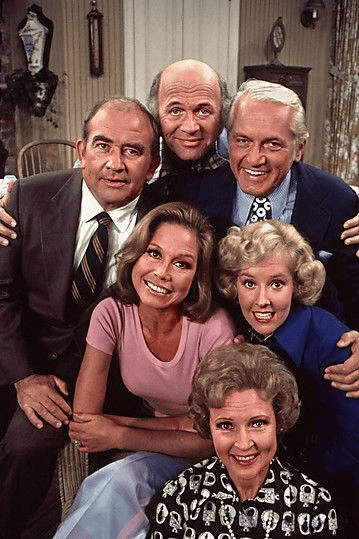
Credits: @HollywoodHistorian / Pinterest
The Mary Tyler Moore Show was a groundbreaking 1970s sitcom that revolutionized television with its portrayal of a single, independent career woman. Mary Richards, played by Mary Tyler Moore, became an iconic figure and role model for women’s rights and empowerment.
At a time when television primarily depicted women as housewives or secondary characters, Mary Richards stood out as a symbol of independence and professional success, paving the way for future portrayals of single women on TV.
The show boasted a stellar supporting cast and dynamic ensemble, including Ed Asner as the gruff but endearing Lou Grant, Gavin MacLeod as the affable Murray Slaughter, and Betty White as the acerbic Sue Ann Nivens.
This ensemble brought many characters to life, each contributing to the show’s unique charm and wit.
Influential episodes of The Mary Tyler Moore Show tackled various social issues, from women’s rights in the workplace to political and social changes in American culture. The series was lauded for its intelligent writing and relatable characters, impacting television history.
It inspired numerous other shows to explore similar themes and highlighted the importance of strong, independent female characters in American television.
All in the Family (1971-1979)
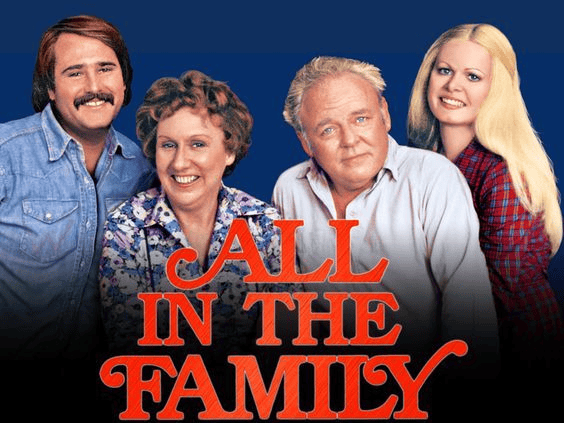
Credits: @darlenechilton / Pinterest
All in the Family is celebrated as one of the most groundbreaking 1970s sitcoms. It is renowned for addressing controversial issues and challenging the status quo. The show boldly tackled topics like racism, sexism, homophobia, and political polarization, bringing these issues to the forefront of American television.
Archie Bunker, portrayed by Carroll O’Connor, was at the heart of All in the Family. Archie, an iconic working-class man, was known for his bigoted views and gruff demeanor. However, the character’s evolving perspectives over the series provided a nuanced look at the complexities of societal change.
The Bunker family dynamics, including Archie’s patient wife Edith (Jean Stapleton), their progressive daughter Gloria (Sally Struthers), and her liberal husband Michael “Meathead” Stivic (Rob Reiner), created a rich tapestry of conflicting ideologies and comedic tension.
The show’s memorable characters and their interactions made All in the Family a cultural touchstone. Its ability to blend humor with serious social commentary set a new standard for television storytelling.
The series’ success led to several spin-offs, including The Jeffersons, Maude, and Archie Bunker’s Place. Each explored different aspects of American life and extended the cultural significance of the original show.
If you are interested in experiencing this classic, you can watch it on IMDb. Its powerful blend of comedy and social critique continues to resonate, offering insight into the era’s political and social climate.
The Jeffersons (1975-1985)
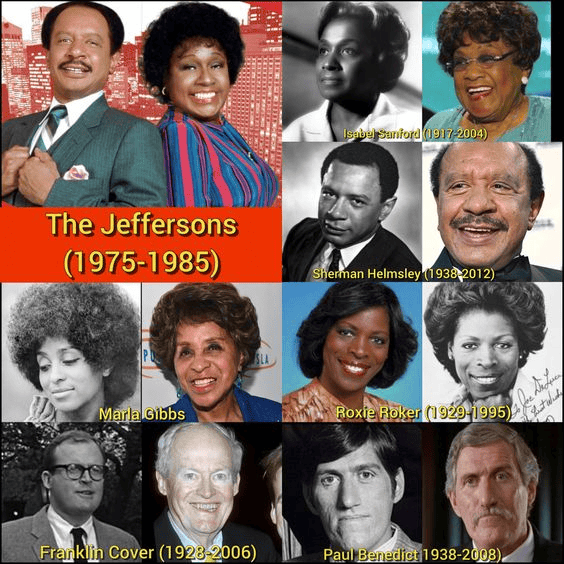
Credits: @casperjaneway / Pinterest
The Jeffersons distinguished itself in the 1970s sitcom landscape by featuring an affluent African-American family at its core. The series, which aired from 1975 to 1985, followed the lives of George and Louise Jefferson, portrayed by Sherman Hemsley and Isabel Sanford.
The Jeffersons’ move from a modest neighborhood to a luxurious high-rise apartment in Manhattan symbolized their economic success and upward mobility.
Compared with Louise’s grace and wisdom, George Jefferson’s ambitious and outspoken nature broke stereotypes and showcased African-American success in a predominantly white, affluent society. The show tackled significant themes such as race relations and social class issues, reflecting the complexities of achieving the American dream.
The Jeffersons were celebrated for their iconic moments, including George’s humorous yet thought-provoking rants and the memorable interactions with their diverse neighbors. The show’s theme song, “Movin’ On Up,” became an anthem of progress and aspiration, embodying the spirit of the series. Catchphrases like “Weezy!” and George’s trademark strut became ingrained in American pop culture.
By blending humor with thought-provoking narratives, The Jeffersons created a platform for exploring important social issues, cementing its legacy as a trailblazer in television history.
The Bob Newhart Show (1972-1978)
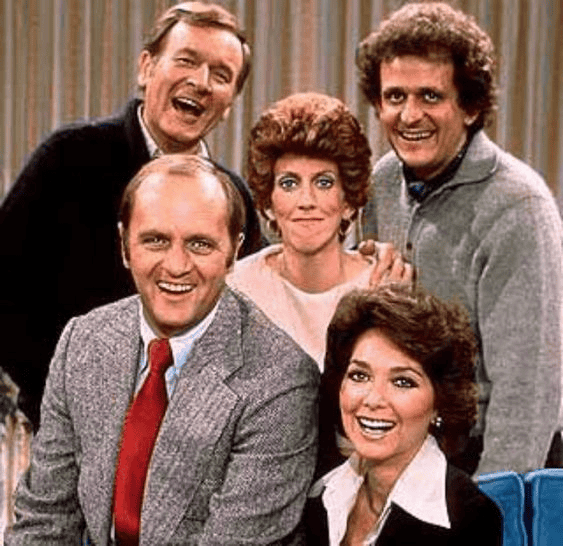
Credits: @tvyesteryear / Pinterest
The Bob Newhart Show stood out in 1970s television with its unique premise and comedic style. Running from 1972 to 1978, the series starred Bob Newhart as Dr. Bob Hartley, a psychologist navigating both his professional and personal life in Chicago.
Bob Newhart brought his trademark deadpan humor and subtle wit to the role of Dr. Hartley, making him a beloved character for audiences. The show focused on Dr. Hartley’s therapy sessions with eccentric patients, blending observational humor with everyday situations.
The supporting cast added depth to the series, with Suzanne Pleshette playing Emily Hartley, Bob’s intelligent and supportive wife. Their on-screen chemistry and the ups and downs of their marriage provided a realistic backdrop for exploring humorous scenarios.
The Bob Newhart Show produced many memorable episodes that showcased its comedic brilliance and enduring popularity. Whether dealing with office antics or quirky patient encounters, each episode contributed to the show’s lasting impact on sitcom humor.
Its clever writing, lovable characters, and timeless humor continue to entertain audiences, solidifying its status as a beloved series in television history.
Happy Days (1974-1984)
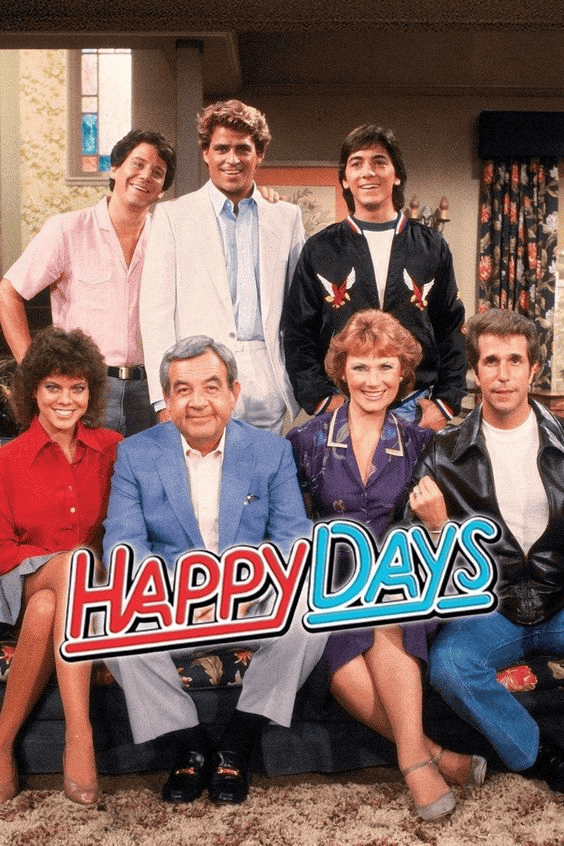
Credits: @Kimberland78 / Pinterest
Happy Days was a beloved television sitcom that aired from 1974 to 1984, capturing the hearts of viewers with its nostalgic portrayal of 1950s Americana and timeless humor.
The show centered around the Cunningham family and their friends in the fictional town of Milwaukee, Wisconsin. Happy Days celebrated the innocence and charm of the 1950s while tackling relatable themes of family, friendship, and adolescence.
The show’s warm-hearted humor and endearing characters, including Richie’s parents, Howard (Tom Bosley) and Marion (Marion Ross), resonated with audiences across generations.
One of the most memorable aspects of Happy Days was its ability to blend comedy with heartfelt storytelling. Whether it was Richie’s romantic misadventures or Fonzie’s cool charisma, each episode captured the spirit of a bygone era while addressing universal experiences.
Its enduring popularity continues to make it a timeless favorite among viewers, reaffirming its place in television history as a cultural touchstone of the 1970s and 1980s.
Laverne & Shirley (1976-1983)
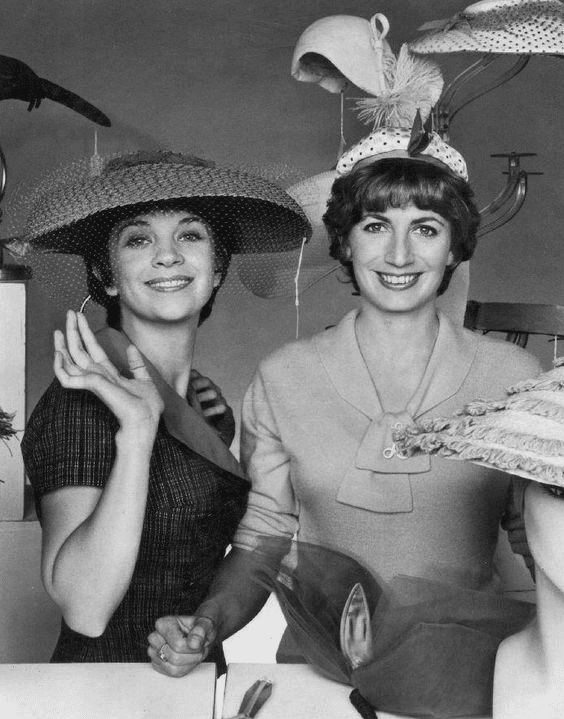
Credits: @elce59/ Pinterest
Laverne & Shirley was a popular sitcom that aired from 1976 to 1983. It is known for its comedic portrayal of two single working-class women in Milwaukee, Wisconsin.
Starring Penny Marshall as Laverne DeFazio and Cindy Williams as Shirley Feeney, the show followed their escapades at the Shotz Brewery, where they worked as bottle cappers.
The series captured audiences with its humor, friendship, and iconic opening sequence featuring the duo skipping down the street while singing “Schlemiel! Schlimazel! Hasenpfeffer Incorporated!” Laverne & Shirley remains a nostalgic favorite for its memorable characters and comedic moments.
The Brady Bunch (1969-1974)
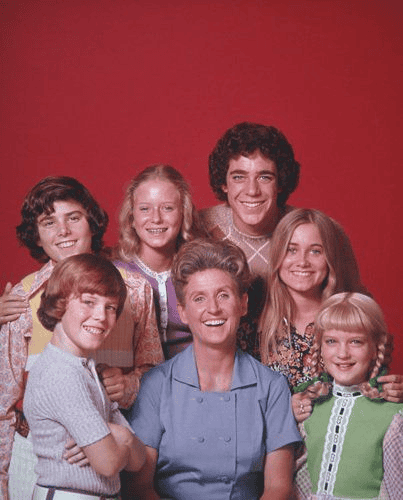
Credits: @imdbofficial / Pinterest
The Brady Bunch is an iconic American sitcom that aired from 1969 to 1974, but its influence extended well into the 1970s and beyond.
The show revolves around the blended family of Mike Brady, a widowed architect with three sons (Greg, Peter, and Bobby), and Carol Martin, a single mother with three daughters (Marcia, Jan, and Cindy).
Set in a suburban home in Los Angeles, California, The Brady Bunch portrayed the challenges and adventures of a large, blended family with humor and heart.
The series became known for its catchy theme song (“Here’s the story of a lovely lady…”), memorable catchphrases (“Marcia, Marcia, Marcia!”), and wholesome storylines that resonated with audiences of all ages.
Throughout its run, The Brady Bunch addressed various themes relevant to its time, including sibling rivalry, adolescence, and family dynamics. It presented a positive portrayal of family life and emphasized the importance of communication and understanding among family members.
The Dick Van Dyke Show
The Dick Van Dyke Show was a classic sitcom that aired from 1961 to 1966, starring Dick Van Dyke as Rob Petrie, a comedy writer for a television variety show, and Mary Tyler Moore as his wife Laura.
Set in New York City, the series followed Rob’s professional and personal life and his interactions with quirky colleagues and neighbors.
Known for its sharp writing, physical comedy, and chemistry between Van Dyke and Moore, The Dick Van Dyke Show became a defining sitcom of the 1960s. The show’s innovative approach to humor and relatable characters earned it critical acclaim and a loyal fanbase.
The Dick Van Dyke Show explored everyday challenges and comedic mishaps in Rob and Laura’s household, balancing work and family life with humor and warmth. The show’s ensemble cast, including Rose Marie as Sally Rogers and Morey Amsterdam as Buddy Sorrell, contributed to its enduring popularity and comedic brilliance.
Wrap up!
The 1970s marked a pivotal era in television history, characterized by a wave of groundbreaking sitcoms that entertained audiences, challenged social norms, and paved the way for future generations of innovative television shows.
From the first episodes to their later seasons, these great shows reshaped the landscape of American culture by addressing pertinent political issues and societal challenges.
They were more than just entertainment; they served as mirrors reflecting real-life struggles and triumphs, resonating with audiences across the country.
Among the most influential were those featuring African-American actors in leading roles, which broke barriers and provided representation previously unseen on mainstream television.
Take a journey through television history and explore the enduring legacy of these groundbreaking 1970s sitcoms.

This Reminds me of old good days.
Kudos